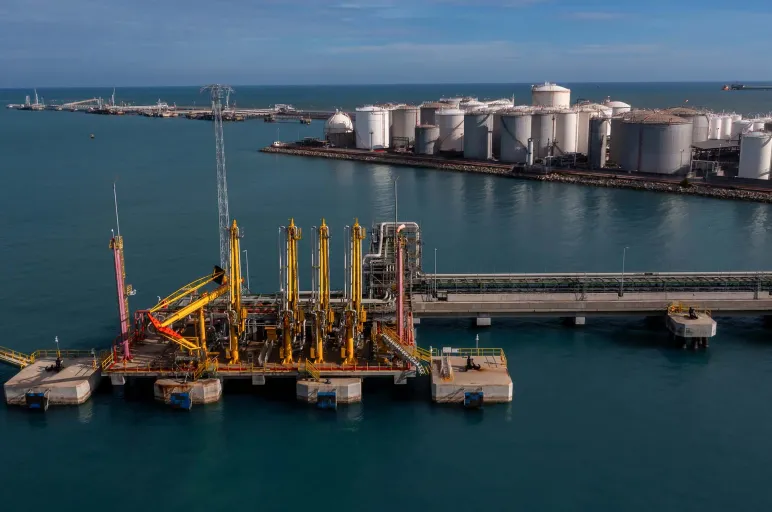
4 ESG Challenges for Oil & Gas Companies (And How to Overcome Them)
- Increasing urgency to reduce emissions along with greater stakeholder scrutiny is driving the need to improve ESG reporting.
- Procurement and supply chain play an integral role in helping oil and gas firms track and report on ESG across complex operations.
- A dedicated sustainability platform can help measure, manage and reporting on ESG performance.
November 16, 2024 | Oil and Gas
The oil and gas industry is facing unprecedented challenges when it comes to achieving environmental, social and governance (ESG) objectives. Growing regulatory pressures, heightened stakeholder expectations and the urgent need to transition toward a more sustainable energy landscape only highlight the industry’s need to improve transparency and accountability on ESG reporting and disclosures.
Addressing these four ESG challenges is a critical area where procurement and supply chain organizations can provide much-needed support. By doing so, they can enable oil and gas companies to mitigate risks, drive innovation, improve brand image and contribute to a greener future.
Challenge 1: Reduce and Remove GHG Emissions
On one hand, there is pressure to reduce and remove greenhouse gas (GHG) emissions from the energy mix, driven by the increasing scientific consensus on the need to limit global warming to 1.5 degrees Celsius. At the same time, the industry faces growing energy demand, particularly in emerging economies.
To achieve this goal, oil and gas companies must significantly reduce their carbon footprints and explore new technologies to capture and store carbon emissions . Efforts to do so are already underway at several oil and gas companies, including Shell and BP.
Procurement and Supply Chain's Role
• Supplier Selection:
Procurement can play a pivotal role in conducting supplier assessments and audits to evaluate and select suppliers with strong ESG credentials that are committed to reducing their carbon footprint.
• Sustainable Procurement:
Implementing sustainable procurement practices, such as prioritizing suppliers that use renewable energy or have efficient operations, can help to reduce the company's overall carbon footprint.
• Supply Chain Collaboration:
Modern platforms enable supply chain teams to collaborate with suppliers to identify, track and report on emissions data, and then take action on opportunities to reduce emissions across the supply chain.
Challenge 2: Withstand Greater Scrutiny from Stakeholders
Stakeholders, including investors, regulators and communities, are increasingly taking note of the ESG performance of oil and gas companies. This is driven by a growing awareness of the industry's environmental and social impacts, as well as a desire for greater transparency and accountability.
Procurement and Supply Chain's Role
• Risk Management:
Procurement can help to identify and mitigate ESG risks in the supply chain by conducting due diligence on suppliers and ensuring that they comply with relevant regulations and standards.
• Stakeholder Engagement:
Procurement can engage with suppliers to ensure that they are meeting stakeholder expectations and addressing any concerns related to ESG issues.
• Transparency and Accountability:
Procurement can help to ensure that the company's supply chain is transparent and accountable by requiring suppliers to disclose their ESG performance and comply with reporting standards.
Challenge 3: Navigate a Complex Regulatory Landscape
The body of regulation governing the oil and gas industry is becoming increasingly more complex, with new and upcoming laws and regulations at both national and international levels. These regulations address a wide range of ESG issues, including climate change, human rights and environmental protection.
Procurement and Supply Chain's Role
• Regulatory Compliance:
Procurement can help to ensure that suppliers are compliant with relevant regulations and standards by conducting due diligence and implementing appropriate compliance measures.
• Risk Management:
Procurement can identify and mitigate risks in the supply chain by working with suppliers to ensure that they are following regulations.
• Innovation:
By sourcing new technologies and materials that can help to reduce the environmental impact of the company's operations, procurement can drive innovation.
Challenge 4: Improve Transparency and Accountability in ESG Reporting and Disclosures
The demand for greater transparency and accountability in ESG reporting and disclosures is increasing, driven by investor pressure, regulatory requirements and public expectations.
Procurement and Supply Chain's Role
• Data Collection:
Procurement can help to collect data on the ESG performance of suppliers, which can be used to inform the company's overall ESG reporting.
• Supplier Engagement:
Procurement can engage with suppliers to ensure that they are reporting their ESG performance accurately and consistently.
• Transparency:
Procurement can help to ensure that the company's supply chain is transparent by requiring suppliers to disclose their ESG performance and comply with reporting standards.
A dedicated sustainability platform can help companies, especially oil and gas companies, address ESG challenges.
By providing a centralized hub for measuring, managing and reporting on ESG performance, these platforms enable companies set targets, align goals with business objectives, measure and track performance across a range of metrics and take action on various initiatives, like reducing emissions, improving supplier diversity and enhancing governance.
By integrating sustainability platforms with broader procurement and supply chain management systems, companies can gain deeper insights into their operations and make more informed decisions, leading to improved ESG performance, reduced risks and enhanced stakeholder relationships.



